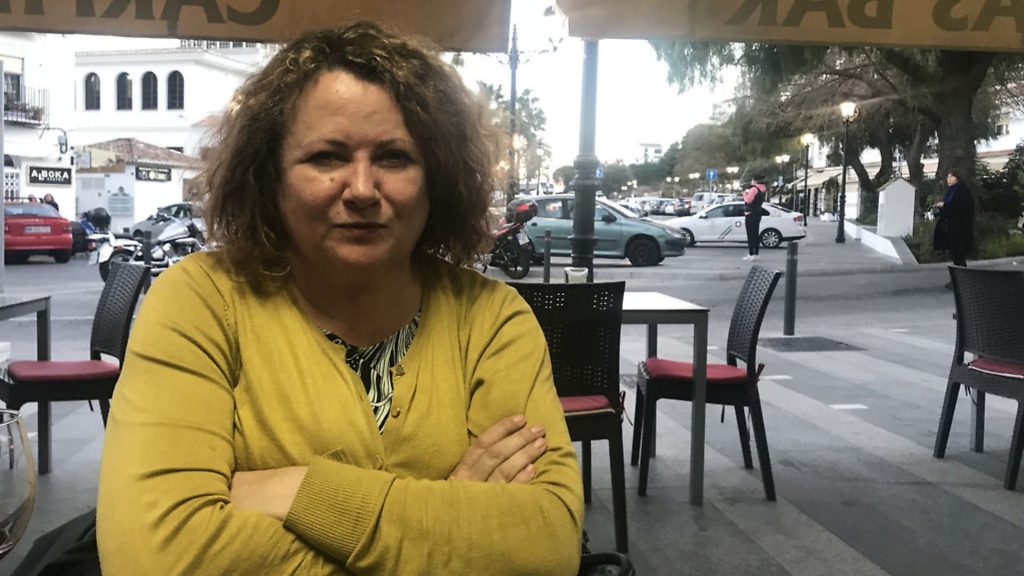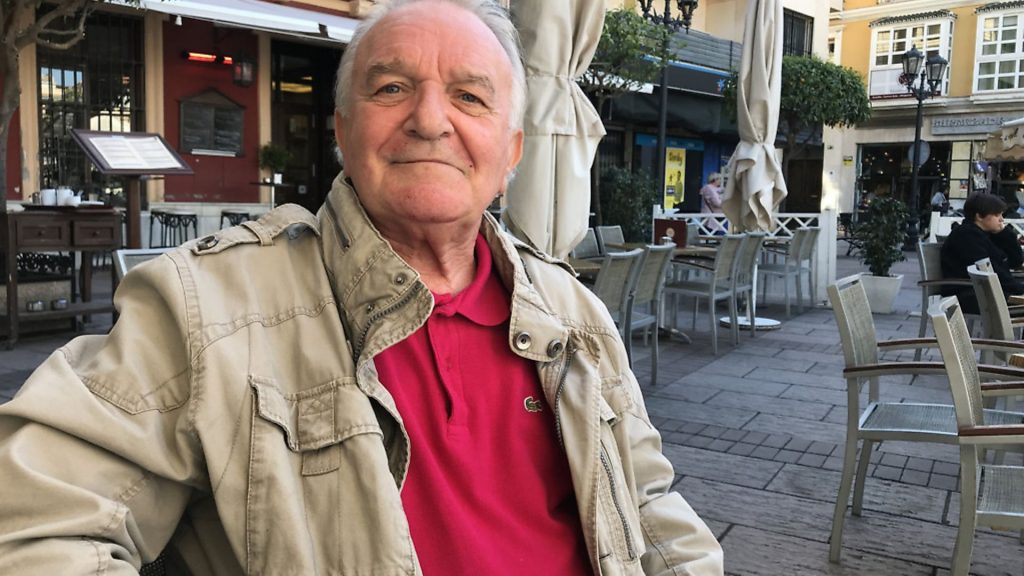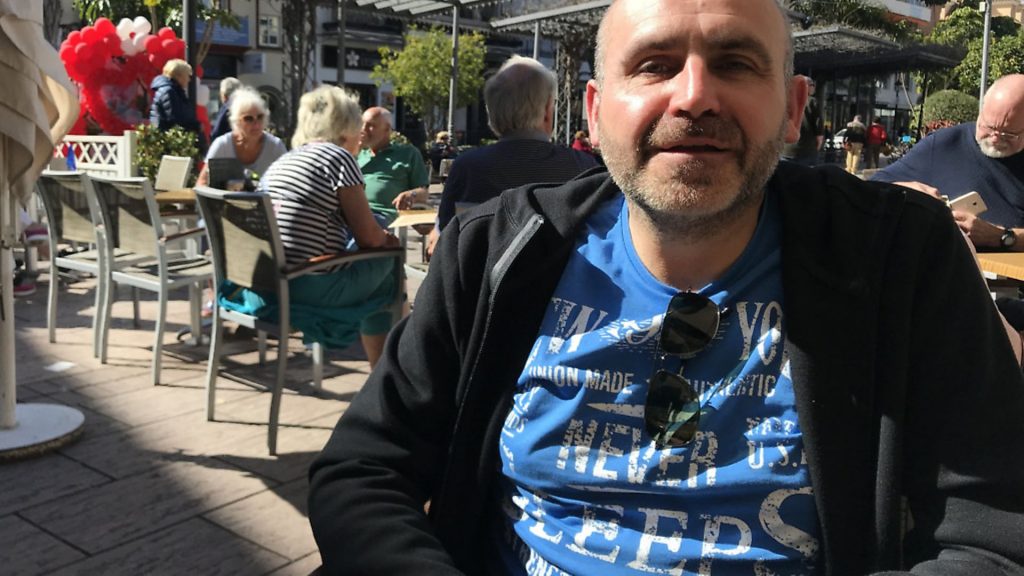
Touring Fuengirola’s seafront it isn’t only the British pubs adorned with the Union Jack, souvenir touts or pasty tourists that put you in mind of Skegness, Blackpool or Great Yarmouth.

British expats are living on one of Brexit’s front lines. But on atrip to the Costa del Sol, GERALDINE SCOTT finds them every bit as divided as those back in the UK, albeit with some crucial differences.
As in those British seaside towns where the Leave vote was highest in the 2016 referendum (75.6%, 67.5% and 71.5%, respectively) you do not have to look too hard among the expatriate community to find evidence of strong support for Brexit.
One of those most fervently in favour is Len Howard, 70, who sips a café con leche in the shadow of a whitewashed church, in the central Plaza de Constitucion. He believes the referendum result was ‘wonderful’ and will ‘make Britain’s glory come back’.
Such full-throated support for leaving the EU from an expat might sound counter-intuitive. After all, the 300,000 Brits who live in Spain (mostly on the Costa Del Sol or the east coast’s

Costa Blanca) have as much to lose as anyone.
Around 35% of expats in Spain are over 65, making healthcare and pensions areas of grave concern. Their future status remains uncertain, with suggestions that they could lose free health provision and be forced to take out expensive health insurance.
The devaluation of the pound since the Brexit vote has made life more difficult already – pensioners are finding themselves up to 160 euros a month worse off. And although pensioners in Spain are currently entitled to the yearly state pension increase, once the UK leaves the European Economic Area it could mean payments are effectively frozen.
Meanwhile, for those who are still working, there are questions about how easy this will be, if visas are suddenly required. And many expat businesses revolve around UK tourism, which could also take a hit, after Brexit.

Of course, amid the villas in the quieter, more suburban areas away from the seafront, there are hotbeds of Remain every bit as fervent as anywhere in the UK. Campaign groups such as Bremain in Spain have been quick to organise resistance to Brexit and fight for a public vote on the final Brexit deal.
But, as Len shows, British expat society is as divided as the UK itself. In some ways, it is a perfect microcosm. The same splits can be observed, among socio-economic and geographic (where expats are from in the UK) lines observed. (My sample size is admittedly tiny, but of those I speak to, the Scottish expats seem to be the most pro-Remain).
Len is alive to the charge of hypocrisy that can be levelled at him and other pro-Brexit expats – wanting Britain to leave the EU, while choosing to live in a country which is part of the Union. And he answers it robustly. ‘Four of my daughters married Spanish. I like their language, I like their food, I like their lifestyle. And I think they’re quite nice people.’
He loves his home country, but adds: ‘If I wish to live in the sun nine months of the year near my family who were born here… it’s got f**k all to do with anyone else. And if you want to question me, you question me, but I go back eight, nine, 10 times a year and I pay tax to the airline. That tax goes into the revenue of our government. I’m not taking out, but I paid in to my system.’
Originally from the East End of London, he is fan of UKIP – ‘Nigel is one of my heroes’ – and has a list of political pet hates, not all of which have much to do with the EU: the Human Rights Act, foreign aid, immigration, political correctness, under-funding of the NHS and money given to Brussels.
He believes Brexit is a triumph of taking back control and dismisses naysayers and ‘buffoon’ politicians who say Britain will suffer as a result. You have to envy Len’s positivity. He is even a fan of David Davis: ‘I like Davis, this boy don’t stand no s**t, old Davis.’
While Len insists his pro-Brexit views are prevalent among expats, it is hard to establish how true this is. Many long-term residents couldn’t vote in the referendum.
To register as an overseas voter you had to have lived in the UK within the last 15 years. For those who were eligible – including Len – statistics on how they voted are hard to come by. Estimates before the vote predicted around 72% of those living abroad would vote Remain (so not quite like those British seaside resorts!). On the streets of Fuengirola, my own small sample size found around a 50/50 split.
Sandra Watson worked around the world as a teacher but made sure she returned home to Scotland to vote in the referendum in 2016. She moved to Mijas Pueblo – a pretty, little village on the outskirts of Fuengirola – just nine months ago.
We met in a small tapas bar close to the centre of town. The 57-year-old said she had always planned to move abroad again but the referendum result made the decision more urgent. ‘I thought ‘you are having a laugh, you are joking’,’ she says. ‘So that was it for me, I immediately started looking for jobs. I thought ‘no way am I staying on this sh**ty island and not being part of Europe’.’
Having lived through Thatcherism, which ‘decimated’ her area of Clydebank, in Glasgow, she feels Brexit will spark new deprivation.
‘Clydebank never totally recovered (from Thatcherism). I was 17 and had just left school, and three generations of mostly males were unemployed. You read it in the books and think it was tough but we were laid out to rot,’ she says. ‘I could not watch it again.’
This isn’t the only time I hear Remainer expats liken post-Brexit Britain to the 1970s and 1980s. Dave Forsyth, 52, an electrician from Inverness, says: ‘I’m old enough to remember the 1970s, probably in the early days when we were in the common market. Britain was a crap country.
‘Inflation was crazy, I can remember there being power cuts quite regularly. This is what really hacks me off – this Second World War spirit, this is what is wrong with the UK… they live in the past and look at it through rose-coloured spectacles.’
He feels betrayed by the Brexit vote, having voted ‘no’ in the Scottish independence referendum in 2014 based on the claim it was the only way Scotland could guarantee staying in the EU. He feels the rug has been pulled from beneath him.
Dave bought an apartment in Fuengirola in 2015 with the intention of renting it out and eventually retiring in the sun. But, as a result of the vote, he spends an ever-increasing amount of time in Spain as he longs to keep his European connection.
Indeed, Dave’s experience shows why expat Spain is not quite the microcosm of Britain.
Here, on the coast of Spain, the sense of British identity among expats is intensified: you can see it in the Union Jacks, the British-themed pubs and the popularity of the greasy spoon breakfasts; but so too is a sense of European identity. Many people, like Dave and Sandra, moved here specifically to be more European.
It means the divisions wrought by Brexit and felt across Britain are all the more potent here, and the debate even more polarised. Added to that is a greater sense of powerless among people who feel overlooked and unrepresented at Westminster, and a heightened feeling of vulnerability.
Those on the Costas could be among Brexit’s greatest victims.









